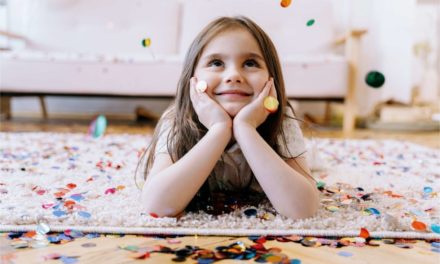Every parent knows that having a little fun with their children is essential. But they don’t have to be genius to figure out how to entertain a tiny baby, and there are many activities to do with infants that parents can pursue. Remember, your baby already starts to experience physical, mental, social, and emotional changes before their first birthday.
No matter how engaged you are with your baby in those diaper changes, feedings, and naps, there will be times when your newborn is fully active and ready to engage with you. Everything we do or any activity we engage with them has a learning curve for them. So you have to consider what activities will interest you and are fun for your child, and, importantly, helps in the development of your newborn.
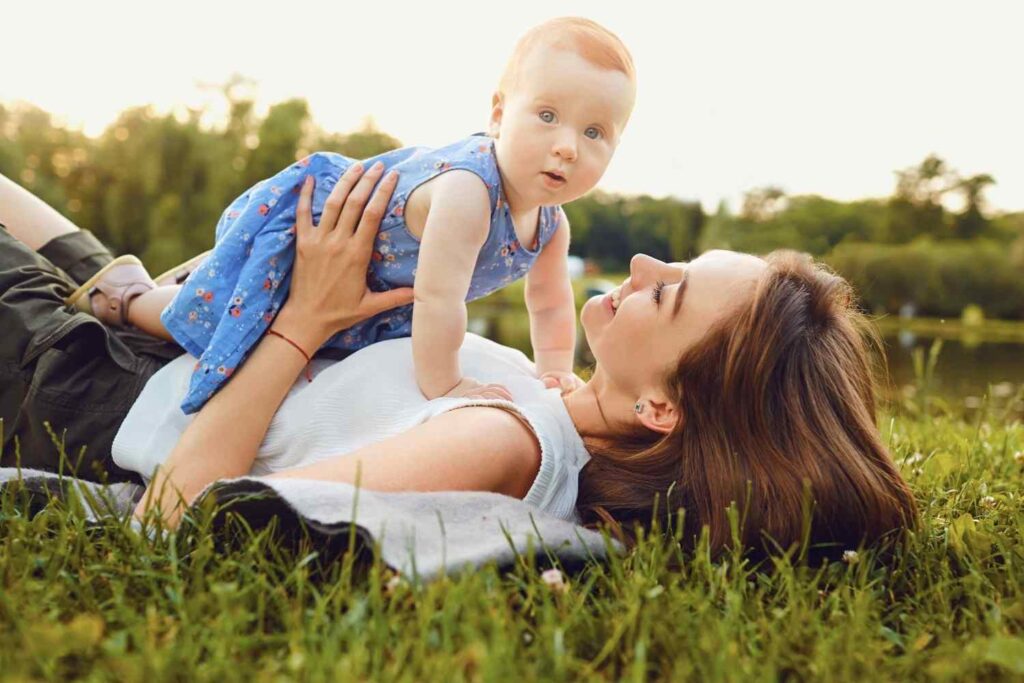
But Not to worry! This handy guide covers activities from birth to age two. Not only are they still more interested in and aware of the world around them, but your newborn will soon be crawling, cruising, or walking around in it—if they’re not already. There’s no stopping their progress into toddlerhood, and with some encouragement, you can help them reach the next stage easily—and have lots of fun along the way.
Our review process for the Best Activities to do with Infants and Newborns?
Our review process includes a proper flow of queries, questionnaires, forms, and surveys we conduct to choose the Best activities to do with infants and newborns.
While these methods are being conducted via emails and other means, our research team grabs the opportunity to research on the internet by thoroughly researching competitors, reading reviews, and more! In case of a mixup, we cross-verify it to ensure our audience gets the most authentic and up-to-date information from us, with love.
Peekabo:
Place any object like a toy or something under a blanket, covering only part of the object. Tell your baby, “Look for the object.” Ask them, “Where is it?” If your baby grabs the object, that’s normal, and it’s a sign that he’s interested and eager to play. This helps develop object permanence, which is part of early learning. It stimulates the baby’s senses, helps build gross motor skills, strengthens visual tracking, encourages social development, and tickles their sense of humor.
Puzzles:
A child develops a sense of recognition and capability to solve large wooden puzzles around their first birthday. It’s best to choose the best combination of colors, shapes, and elements and solve them first in front of them and show them how it works. It also develops your child’s problem-solving and critical-thinking skills, both crucial for mastery of other skills later in life. Puzzles can help children with pattern recognition, memory, and gross and fine motor skills. The Buffalo Games – Cinque Terre and GeoToys geography jigsaw puzzles have great reviews from parents, and the Ravensburger planets puzzle is also best for learning planets.
Talk to your baby:
You may be wandering in your thoughts about why would you talk to your baby when she can’t even understand, right? While you’re at the right point, babies pay special attention to their surroundings, including the sound of human voices during the first month. They may turn their head toward you and listen closely when you speak to them. They may even make subtle movements of their arms and legs in time with your speech.
Read to your baby:
Just like talking, reading to your baby is also very effective. Try reading a simple story to your little one a couple of days in a row and observe their behavior; they will recognize the sounds of those words, and you will notice a change in your baby’s body language as well. Read some good books and stories that are interesting and worth their memory. You might already have some books at your home, or you can always explore and choose the best for your little champ. My First Library and Ditty Bird are some great books with recommendations.
Container Play:
Start with a big container with a large opening – Place a few toys in it and make sure you let the baby watch you put in (one way babies learn is through watching…even if they’re not ready to repeat the action quite yet). Now hand the container to the baby, and they will probably play with it, turning it over and over again. Either way, with the sounds of those toys tumbling around, your baby will realize the gist of those rattling toys inside, and they will start shaking and banging. Pushing it to see those toys fall out of it. Reload the container until your little one learns how to do it themselves.
Play tracking games together:
One of the essential things that babies develop during their first few months or years is their vision. That is why it is beneficial to carry some eye-catching movements in front of them to encourage tracking. For example, take a doll out of a doll house, do some activity with it or play a little around and put it back in the doll house, or carry a little body movement like making signs with hands while talking to them or even moving your head slowly from side to side. Make sure your baby watches every bit of it to develop their mind with learning capability.
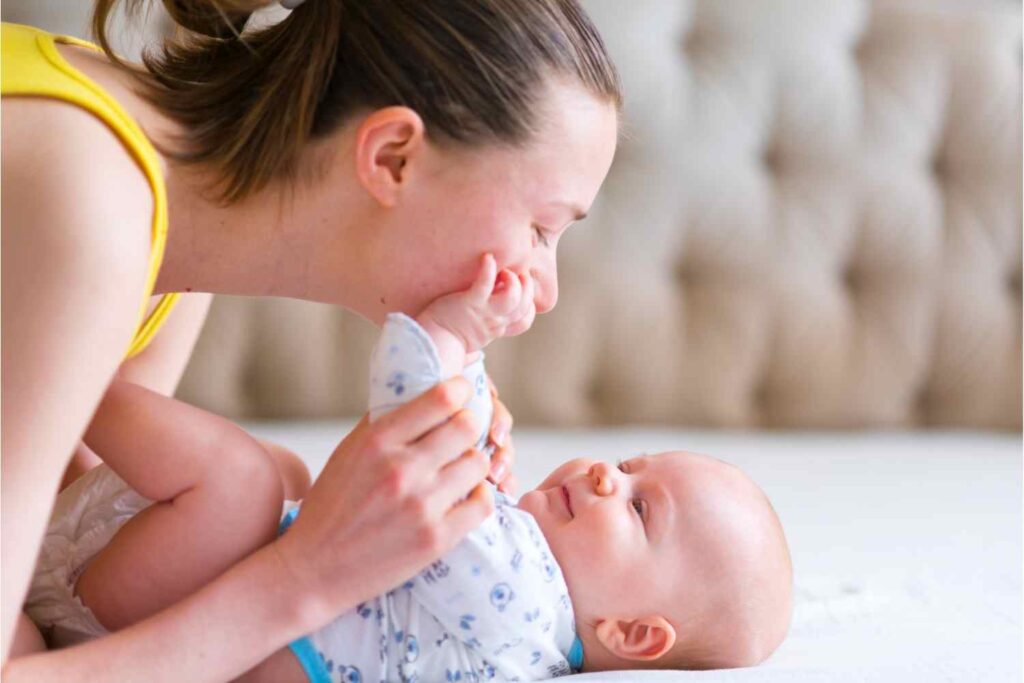
Sing to your baby:
When we say sing to your baby, we mean those poems and baby songs in a soft voice while your baby’s full attention will be on you. Having a great voice doesn’t matter here, as singing softly will likely have a soothing effect on your newborn when they’re feeling a little fussy. Some terrific baby songs of your choice would do the trick here. Try Greatest Baby Lullabies Audio or Old MacDonald Had a Farm in Prime Video for the best options.
Baby mirror games:
A mirror game? It often seems odd at first, but every new vision and sight is a new thing for your little one, and the mirror is one of them. They often see things, but seeing their own reflection repeating the same actions as them would catch their attention. Holding your baby in front of the mirror and letting them look at themselves, you might even get them to reach out and touch their face.
Baby massage:
Baby massage has many benefits. It is a natural relaxing way, especially after a long, tiring day. It is also a great bonding experience. Baby massage is gentle and calming for both the baby and the parent. You can get in touch with your feelings and connect to your child. Just make sure you learn about baby massage and the appropriate way of doing it, and besides, considering the many benefits of this, there’s no reason you shouldn’t try to learn and give your little one a touch of love.
Smiling games:
Your every effort toward your baby shows your love, and making them smile is one of those most delicate moments. Stick out your tongue, and make silly, funny faces at them, making strange noises. Don’t be alarmed if you don’t see any smiles until the first few months of your newborn baby. Those early smiles are more likely reflexive than real. Your baby will learn how to smile as it gets older.
Strolling with your baby:
Putting some nice clothes on your baby, putting them in a stroller or a baby carrier, and going for a walk for fresh air have many benefits. You’d be surprised how much fun a stroll around the corner could be for your baby. Not only does this open their eyes to new possibilities, but it also provides a fantastic way for you both to bond. Of course, the key here is to prepare for every little adventure and to allow your baby to have a peek at the outside world, nature, people, etc. Brands like Graco and Maxi-Cosi have a wide range of these baby gear products that helped parents like you and me.
Clapping Baby’s hands together:
Your baby will probably learn to clap after a few months; make sure to sing your favorite song to them and clap their hands gently without any hard pressure. Clapping has always been beneficial and healthy for babies, and it also creates a unique and loving bond between a parent and a baby.
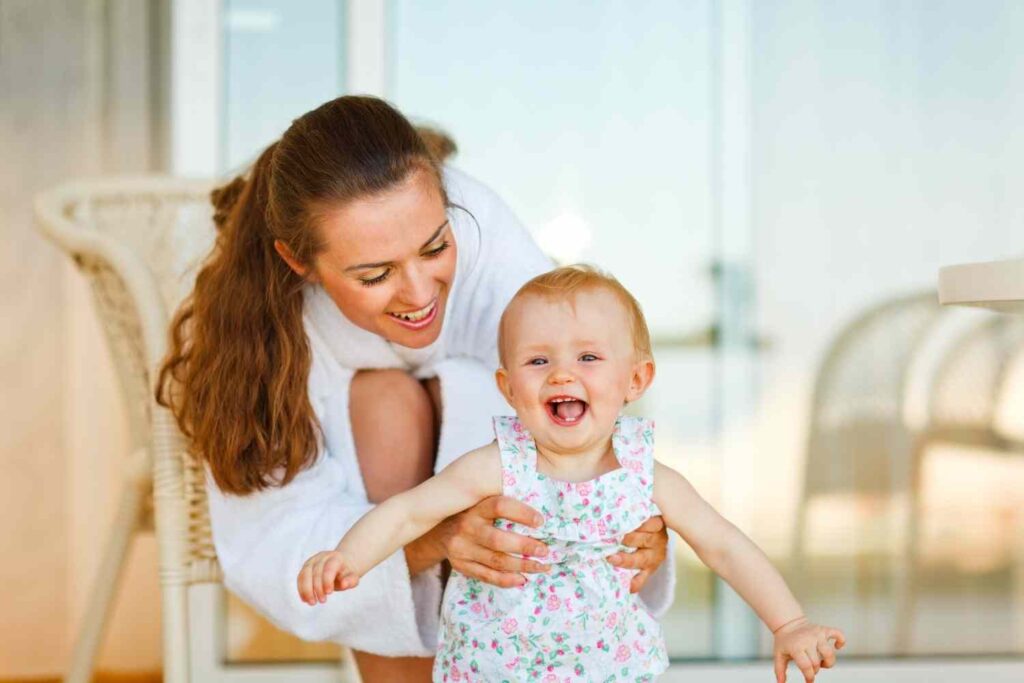
Finding Cheerio:
Babies love cheerios, hide a Cheerio under a cup on a table or countertop and ask your baby to pick up the cup and find it and observe their behavior; or take two cups and put a piece of Cheerios in each of the cups and get them to move them around, using two different colored cups. Then make them switch the two cups. This simple activity also reinforces a child’s ability to control attention and to focus on a single object.
Play with dolls:
Playing with these, such as dolls, stuffed animals, etc., is another excellent way to inspire your little one. Babies start to pretend such actions at around seven-nine months; many babies will pretend to guard their dolls, feed them, make their stories, etc. The key here is to initiate pretend play with your baby; this is a great way to foster their creativity, socialization, and imagination.
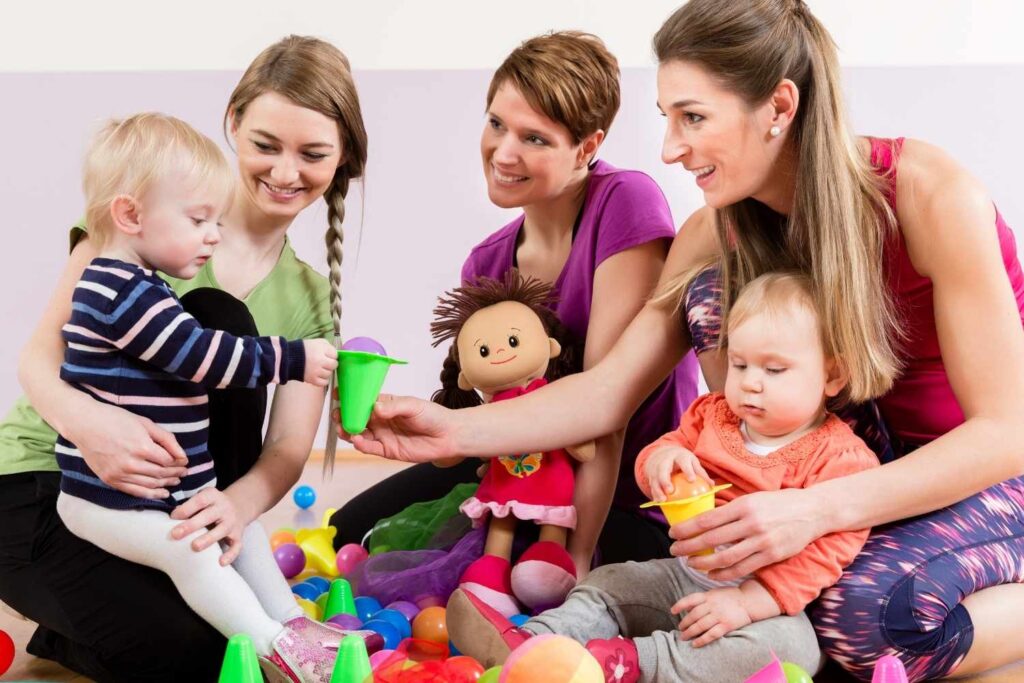
Counting & numbers:
Every baby has its own unique pace of learning things, and It can be a while before your baby recites the 123s, but it doesn’t mean it’s too early to introduce letters. So start writing things—anything and everything—to your child. Introduce numbers and counting early and use them in their upbringing; loudly count the grapes while pouring them into their bowl or count cars, apples, and objects in front of them to give them a sense of it. Remember, What’s important is that your child will be learning a very important mathematical concept called one-to-one correspondence. There are also many numbers games available for babies and kids for this purpose.
Do housework together:
It is also essential for parents like us to teach our kids some responsibilities in their daily lives. For children older than one year, it’s important to show them what it is like to carry house chores, or even a helping hand in the laundry would also be effective. Even mothers doing house chores in front of their babies daily would groom their baby’s minds toward a disciplinary and ethical environment.


